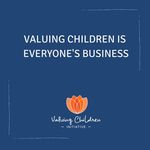THE VALUING CHILDREN INITIATIVE
←
→
Page content transcription
If your browser does not render page correctly, please read the page content below
STATE ELECTION PRIORITIES 2021
Acknowledgement to country
The Valuing Children Initiative acknowledges
Aboriginal and Torres Strait Islander people as the
Traditional Custodians of this land and its waters.
We pay our deep respect to Elders past, present
and future, and extend this to all Aboriginal and
Torres Strait Islander people.
FOCUS ON CHILDREN
The COVID-19 pandemic has had a profound
impact on countries, communities and individuals
across the world. In Western Australia, decisive
leadership with a focus on public health and a fair
measure of good fortune has meant that we have
avoided the worst impacts of the pandemic.
However, despite our relatively favourable
position, there is no doubt that our community has
been challenged by the pandemic with financial
hardship, unemployment, underemployment,
soaring rental prices, domestic violence, mental
health, child protection and homelessness all
emerging as prominent issues for the West
Australian community.
At a federal level, the JobKeeper and Coronavirus
Supplement payments have had a protective
impact on families by reducing poverty compared
with pre-COVID-19 levels. In particular, the poverty
rate for single-parent families more than halved
from 20% to 8% [1]. Unfortunately, this support has
now been significantly decreased and is likely to
cease entirely in the coming months. The result
will be a return to poverty for many families.
Arguably, one outcome of the pandemic is that
community attitudes in relation to social issues like
poverty and unemployment have softened. Many
West Australians have faced unemployment,
financial hardship and housing instability for the
first time. Consequently, the narrative around
these issues has also shifted; there is now a more
[1] Australian Institute of Health and Welfare (2021) sophisticated and nuanced discussion with less
Child protection in the time of COVID-19
blame and judgement attached.
VALUINGCHILDRENINITIATIVE.COM.AU 1STATE ELECTION PRIORITIES 2021
Recognising the crisis, and the need for The Valuing Children Initiative calls upon
intervention, state and federal governments have political parties in Western Australia to
been quick to respond. To protect our entire prioritise children :
community, and to support people in need,
governments have been proactive and creative in
finding solutions; increased government spending APPOINT A MINISTER FOR CHILDREN
has been an important part of the response in
Western Australia and nationally. This response
has been broadly welcomed by Australian society
suggesting that many Australians want their LEGISLATE THE USE OF MANDATORY
governments to resolve complex social issues by
spending money on solutions.
CHILD IMPACT STATEMENTS
In the midst of a rapidly changing world, we
mustn't lose sight of our children. All children
END CHILD POVERTY IN WESTERN
deserve a safe, healthy and happy childhood but
this is not the reality for many children. Children
AUSTRALIA
have no choice about the circumstances of their
birth, or their childhood, and we know that
childhood experiences shape adulthood.
INCREASE SPENDING ON PREVENTION
Therefore it’s important that we take collective
responsibility for the wellbeing of all children.
AND EARLY INTERVENTION
VALUINGCHILDRENINITIATIVE.COM.AU 2STATE ELECTION PRIORITIES 2021
Policy recommendation
APPOINT A MINISTER FOR CHILDREN
Create a senior ministerial portfolio with
the title ‘Minister for Children’ or
Why this is important ‘Minister for Children and Youth’
Government policies and decisions directly affect children and young people and it essential that
their voices and needs are represented at the highest level. Ministerial portfolios and the relative
seniority of ministers is a reflection of government priorities. The fact that Western Australia does not
have a Minister for Children sends a clear signal that the wellbeing of children isn't a high priority.
Currently, there is no single minister who considers the needs and wellbeing of all children. We have
a Minister for Child Protection, Minister for Education and Training and Minister for Youth; all of these
ministers consider the needs and wellbeing of some children but their consideration is confined to the
limits of their respective portfolios. At a ministerial level who advocates for and with all children and
young people?
The appointment of a Minister for Children is an acknowledgement that children are important and
that their needs and wellbeing are a priority for the West Australian government.
Policy recommendation
LEGISLATE THE USE OF MANDATORY
CHILD IMPACT STATEMENTS Introduce a mandatory, legislated
requirement to use Child Impact
Why this is important Statements when making decisions or
writing policies that directly and
Currently, there is no requirement to consider the indirectly impact children.
impact that government decisions and policies
will have on children, and there is no standard way of measuring and recording how prior decisions
and policies have impacted children. The introduction of a standardised and mandatory Child Impact
Statement process will ensure that the needs and wellbeing of children have been considered, and
the impact on children is recorded. Additionally, the adoption of a mandatory Child Impact
Statement process will ensure that the views and voices of children and young people are sought and
considered when important decisions are made.
It’s critical to note that Child Impact Statements are important even when there is not an obvious
impact on children; in fact, government can use a standardised Child Impact Statement process, to
identify and record how children could, or would, be impacted (negatively and positively).
A Minister for Children would be ideally placed to progress and oversee the use of Child Impact
Statements within government.
VALUINGCHILDRENINITIATIVE.COM.AU 3STATE ELECTION PRIORITIES 2021
Policy recommendations
END CHILD POVERTY IN WA
Targeted support for the 94,000
children (and their families) in Western
Why this is important Australia growing up in poverty.
Increase social housing stock by at
Child poverty remains the single biggest factor
least 2500 new dwellings per year for
affecting early childhood development; we know
the next five years.
that children who grow up in poverty are adversely
Implement private rental assistance
affected not only in childhood and adolescence
but into adulthood. 94,000 West
An estimated packages for low-income families.
Australian children live in poverty . Expand KidSport eligibility criteria to
include any family experiencing
Children in the most disadvantaged areas in WA
financial hardship.
have high rates of developmental vulnerabilities,
Increase funding to homelessness
with 1 in 3 children assessed as developmentally
support services so that more
vulnerable in one domain and 1 in 5
accommodation requests can be met.
developmentally vulnerable in two or more domains
Increase financial support to low-
[2].
income families with school aged
In WA currently, around 9000 people are homeless
children to assist with educational
each night. This includes 1200 children under the
expenses: include funding for
age of 12. Two out three requests for
extracurricular tutoring and music
accommodation via homelessness services go
unmet. Securing rental accommodation is a lessons.
problem for many; an estimated 98% of rental
properties in the current market are not affordable
for people on the minimum wage. For low-income
households who do have a rental home some 48%
are experiencing rental stress [3]. The WA
government can level the playing field for children
in low income families by ensuring affordable
housing and by making it easier to access
opportunities that will help them to thrive.
Children have no control over the circumstances of
it is morally
their birth, or their childhood, and
indefensible to leave children to grow up in
poverty . With a healthy economy and significant
budget surplus, the WA government can
significantly reduce, or even eliminate, child
poverty in our state. By actively seeking to reduce
and eliminate child poverty at a local level, WA can
lead the way nationally and raise the bar for all [2] The Early Years- Investing in our Future Report (2020)
Australian children. [3] Shelter WA Fact Sheet
VALUINGCHILDRENINITIATIVE.COM.AU 4STATE ELECTION PRIORITIES 2021
Policy recommendations
INCREASE SPENDING ON PREVENTION
AND EARLY INTERVENTION Mental health: Increase prevention
spend from 1% to 5% of total mental
health spend.
Why this is important
Health: Increase investment in health
A shift from reactive, problem-based spending to prevention to at least 5% of the total
proactive, solution-focused spending is required health budget.
to improve child wellbeing.
Child protection: Increase spending on
prevention and early intervention from
A child should not have to demonstrate that he
just under 5.3% to 10% of total child
or she has a significant problem before services
protection budget. Prioritise funding
are offered if it is possible to pre-empt and
prevent that problem from occurring in the first for ACCO's providing out-of-home care
place. By supporting children and families early and family support services.
we can increase wellbeing across the lifespan. Prioritise and increase investment in
Aboriginal and Torres Strait Islander
For example, with rates of childhood obesity
continuing to rise we must protect our children service design; fund community-
from harmful advertising: 74% of outdoor food controlled organisations to deliver
advertising within 500 metres of Perth schools is
services.
for unhealthy food and drink. Targeting children
Prioritise funding for evidence-based
with advertisements for unhealthy food and drink
prevention and early intervention
is clearly not in their best interests. Protecting
services and supports for children and
children from this type of advertising will have a
families.
positive impact on the health of children now
and is likely to reduce the burden on the health Ban advertising for unhealthy food and
system in the future. When considering the drink on all State-owned assets and
wellbeing of all children, focusing on prevention
within 500 metres of schools.
and early intervention is common sense. It also
makes good long-term economic sense.
The WA government can support Aboriginal and Torres Strait Islander children by increasing
investment in Aboriginal and Torres Strait Islander service design, and delivery, by community-
controlled organisations, in line with self-determination and the aspirations of communities.
In WA, Aboriginal and Torres Strait Islander children are 16.7 times more likely to enter out-of-home
care than non-Indigenous children. This is the highest rate of over-representation in the country
yet we spend the least of any state or territory on early intervention and family support (5.3%) [4].
Increased funding for Aboriginal Community Controlled Organisations (ACCO's) providing out-of-
home care and family support services will help to shift these statistics.
[4] Family Matters Report 2020
VALUINGCHILDRENINITIATIVE.COM.AU 4STATE ELECTION PRIORITIES 2021
For more information on The Valuing Children Initiative
Contact Maddie McLeod
Development Executive
MMcLeod@valuingchildren.com.au | (08) 9325 6644
The Valuing Children Initiative acknowledges and supports:
WACOSS
State Election Priorities
WA Association of Mental Health
Prevent, Support, Heal Manifesto State Election platform
Anglicare WA’s
Head, Heart, Home 2021 State election social policy recommendations
Public Health Association Australia
Striving towards a healthier WA: 2021 and beyond
VALUINGCHILDRENINITIATIVE.COM.AU 5STATE ELECTION PRIORITIES 2021
Follow The Valuing Children Initiative:
facebook.com/valuingchildreninitiative/
instagram.com/valuingchildreninitiative/
linkedin.com/company/valuing-children-initiative/
youtube.com/channel/UCWs98FDox4uunoc8x5_9WdA
valuingchildreninitiative.com.au/
Campaign
valuingchildreninitiative.com.au/creating-an-australia-where-all-
children-can-thrive/
VALUINGCHILDRENINITIATIVE.COM.AU 6You can also read



























































